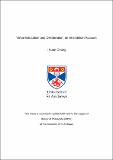Virtue education and deliberation : an Aristotelian account
Abstract
Building on a philosophical reconstruction of Aristotle, this dissertation argues
for a non-intellectualist account of virtue education and practical deliberation.
This dissertation will first examine the notion of habituation. It argues that
habituation consists in immersing into a certain cultural context, through which
one will develop one’s unique ethical sense and will know what is noble and
fine. This rules out two intellectualist positions: that habituation gives us a firm
understanding of eudaimonia, and that habituation itself involves the exercise
of the practical intellect.
The non-intellectualised account of habituation is further supported by a topic-specific
study of Aristotle’s conception of children. In cultivating the seeds of
virtues that are accessible even to children, one forms evaluative appearances
about what is and what is not worth-pursuing by generalising from particular
evaluative experiences. These experiences may come from early private
education, perceptions, emotions, imitation of others’ attitudes and behaviour,
and understanding one’s friends’ decisions. These experiences help shape
one’s ethical sense.
Developing friendship (philia) appears to be ethically important, since we learn
about values through friendship, and since practical deliberation is more like
imagining conversations between individuals we are familiar with. This is in
stark contrast to the intellectualist account of excellent deliberation, which
consists in deliberating through a comprehensive conception of human values.
But ultimately, friendship is ethically indispensable because, as a form of
intimate relationship between agents of equal status, it epitomises an
Aristotelian ideal: an egalitarian ethical community. Arguably, this community
constitutes the context for habituation (immersion).
This dissertation shows how opposing positions concerning a variety of
particular issues become an opposition between two philosophical packages,
one of intellectualist and one of non-intellectualist, and why the non-intellectualist one is closer to the truth.
Type
Thesis, MPhil Master of Philosophy
Collections
Items in the St Andrews Research Repository are protected by copyright, with all rights reserved, unless otherwise indicated.

